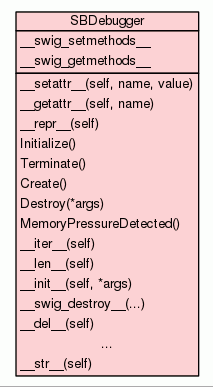|
|
|
|
|
|
|
|
|
|
|
|
|
|
|
|
|
__init__(self,
*args)
__init__(lldb::SBDebugger self) -> SBDebugger
__init__(lldb::SBDebugger self, SBDebugger rhs) -> SBDebugger |
source code
|
|
|
|
__swig_destroy__(...)
delete_SBDebugger(SBDebugger self) |
|
|
|
|
|
|
|
|
|
|
IsValid(self)
IsValid(SBDebugger self) -> bool |
source code
|
|
|
|
|
|
|
SetAsync(self,
*args)
SetAsync(SBDebugger self, bool b) |
source code
|
|
|
|
GetAsync(self)
GetAsync(SBDebugger self) -> bool |
source code
|
|
|
|
SkipLLDBInitFiles(self,
*args)
SkipLLDBInitFiles(SBDebugger self, bool b) |
source code
|
|
|
|
SetInputFileHandle(self,
*args)
SetInputFileHandle(SBDebugger self, FILE * f, bool
transfer_ownership) |
source code
|
|
|
|
SetOutputFileHandle(self,
*args)
SetOutputFileHandle(SBDebugger self, FILE * f, bool
transfer_ownership) |
source code
|
|
|
|
SetErrorFileHandle(self,
*args)
SetErrorFileHandle(SBDebugger self, FILE * f, bool
transfer_ownership) |
source code
|
|
|
|
GetInputFileHandle(self)
GetInputFileHandle(SBDebugger self) -> FILE * |
source code
|
|
|
|
GetOutputFileHandle(self)
GetOutputFileHandle(SBDebugger self) -> FILE * |
source code
|
|
|
|
GetErrorFileHandle(self)
GetErrorFileHandle(SBDebugger self) -> FILE * |
source code
|
|
|
|
GetCommandInterpreter(self)
GetCommandInterpreter(SBDebugger self) -> SBCommandInterpreter |
source code
|
|
|
|
HandleCommand(self,
*args)
HandleCommand(SBDebugger self, str const * command) |
source code
|
|
|
|
GetListener(self)
GetListener(SBDebugger self) -> SBListener |
source code
|
|
|
|
HandleProcessEvent(self,
*args)
HandleProcessEvent(SBDebugger self, SBProcess process, SBEvent event,
FILE * out, FILE * err) |
source code
|
|
|
|
CreateTargetWithFileAndTargetTriple(self,
*args)
CreateTargetWithFileAndTargetTriple(SBDebugger self, str const *
filename, str const * target_triple) -> SBTarget |
source code
|
|
|
|
CreateTargetWithFileAndArch(self,
*args)
CreateTargetWithFileAndArch(SBDebugger self, str const * filename,
str const * archname) -> SBTarget |
source code
|
|
|
|
CreateTarget(self,
*args)
CreateTarget(SBDebugger self, str const * filename, str const * target_triple, str const * platform_name, bool add_dependent_modules, ... |
source code
|
|
|
|
|
|
|
GetTargetAtIndex(self,
*args)
GetTargetAtIndex(SBDebugger self, uint32_t idx) -> SBTarget |
source code
|
|
|
|
GetIndexOfTarget(self,
*args)
GetIndexOfTarget(SBDebugger self, SBTarget target) -> uint32_t |
source code
|
|
|
|
FindTargetWithProcessID(self,
*args)
FindTargetWithProcessID(SBDebugger self, lldb::pid_t pid) ->
SBTarget |
source code
|
|
|
|
FindTargetWithFileAndArch(self,
*args)
FindTargetWithFileAndArch(SBDebugger self, str const * filename, str
const * arch) -> SBTarget |
source code
|
|
|
|
GetNumTargets(self)
GetNumTargets(SBDebugger self) -> uint32_t |
source code
|
|
|
|
GetSelectedTarget(self)
GetSelectedTarget(SBDebugger self) -> SBTarget |
source code
|
|
|
|
SetSelectedTarget(self,
*args)
SetSelectedTarget(SBDebugger self, SBTarget target) |
source code
|
|
|
|
GetSelectedPlatform(self)
GetSelectedPlatform(SBDebugger self) -> SBPlatform |
source code
|
|
|
|
SetSelectedPlatform(self,
*args)
SetSelectedPlatform(SBDebugger self, SBPlatform platform) |
source code
|
|
|
|
GetSourceManager(self)
GetSourceManager(SBDebugger self) -> SBSourceManager |
source code
|
|
|
|
SetCurrentPlatform(self,
*args)
SetCurrentPlatform(SBDebugger self, str const * platform_name) ->
SBError |
source code
|
|
|
|
SetCurrentPlatformSDKRoot(self,
*args)
SetCurrentPlatformSDKRoot(SBDebugger self, str const * sysroot) ->
bool |
source code
|
|
|
|
SetUseExternalEditor(self,
*args)
SetUseExternalEditor(SBDebugger self, bool input) -> bool |
source code
|
|
|
|
GetUseExternalEditor(self)
GetUseExternalEditor(SBDebugger self) -> bool |
source code
|
|
|
|
SetUseColor(self,
*args)
SetUseColor(SBDebugger self, bool use_color) -> bool |
source code
|
|
|
|
GetUseColor(self)
GetUseColor(SBDebugger self) -> bool |
source code
|
|
|
|
GetScriptingLanguage(self,
*args)
GetScriptingLanguage(SBDebugger self, str const *
script_language_name) -> lldb::ScriptLanguage |
source code
|
|
|
|
EnableLog(self,
*args)
EnableLog(SBDebugger self, str const * channel, str const ** types)
-> bool |
source code
|
|
|
|
SetLoggingCallback(self,
*args)
SetLoggingCallback(SBDebugger self, lldb::LogOutputCallback
log_callback) |
source code
|
|
|
|
DispatchInput(self,
*args)
DispatchInput(SBDebugger self, void const * data) |
source code
|
|
|
|
DispatchInputInterrupt(self)
DispatchInputInterrupt(SBDebugger self) |
source code
|
|
|
|
DispatchInputEndOfFile(self)
DispatchInputEndOfFile(SBDebugger self) |
source code
|
|
|
|
GetInstanceName(self)
GetInstanceName(SBDebugger self) -> str const * |
source code
|
|
|
|
GetDescription(self,
*args)
GetDescription(SBDebugger self, SBStream description) -> bool |
source code
|
|
|
|
GetTerminalWidth(self)
GetTerminalWidth(SBDebugger self) -> uint32_t |
source code
|
|
|
|
SetTerminalWidth(self,
*args)
SetTerminalWidth(SBDebugger self, uint32_t term_width) |
source code
|
|
|
|
GetID(self)
GetID(SBDebugger self) -> lldb::user_id_t |
source code
|
|
|
|
GetPrompt(self)
GetPrompt(SBDebugger self) -> str const * |
source code
|
|
|
|
SetPrompt(self,
*args)
SetPrompt(SBDebugger self, str const * prompt) |
source code
|
|
|
|
GetScriptLanguage(self)
GetScriptLanguage(SBDebugger self) -> lldb::ScriptLanguage |
source code
|
|
|
|
SetScriptLanguage(self,
*args)
SetScriptLanguage(SBDebugger self, lldb::ScriptLanguage script_lang) |
source code
|
|
|
|
GetCloseInputOnEOF(self)
GetCloseInputOnEOF(SBDebugger self) -> bool |
source code
|
|
|
|
SetCloseInputOnEOF(self,
*args)
SetCloseInputOnEOF(SBDebugger self, bool b) |
source code
|
|
|
|
GetCategory(self,
*args)
GetCategory(SBDebugger self, str const * category_name) ->
SBTypeCategory GetCategory(SBDebugger self, lldb::LanguageType
lang_type) -> SBTypeCategory |
source code
|
|
|
|
CreateCategory(self,
*args)
CreateCategory(SBDebugger self, str const * category_name) ->
SBTypeCategory |
source code
|
|
|
|
DeleteCategory(self,
*args)
DeleteCategory(SBDebugger self, str const * category_name) -> bool |
source code
|
|
|
|
GetNumCategories(self)
GetNumCategories(SBDebugger self) -> uint32_t |
source code
|
|
|
|
GetCategoryAtIndex(self,
*args)
GetCategoryAtIndex(SBDebugger self, uint32_t arg2) ->
SBTypeCategory |
source code
|
|
|
|
GetDefaultCategory(self)
GetDefaultCategory(SBDebugger self) -> SBTypeCategory |
source code
|
|
|
|
GetFormatForType(self,
*args)
GetFormatForType(SBDebugger self, SBTypeNameSpecifier arg2) ->
SBTypeFormat |
source code
|
|
|
|
GetSummaryForType(self,
*args)
GetSummaryForType(SBDebugger self, SBTypeNameSpecifier arg2) ->
SBTypeSummary |
source code
|
|
|
|
GetFilterForType(self,
*args)
GetFilterForType(SBDebugger self, SBTypeNameSpecifier arg2) ->
SBTypeFilter |
source code
|
|
|
|
GetSyntheticForType(self,
*args)
GetSyntheticForType(SBDebugger self, SBTypeNameSpecifier arg2) ->
SBTypeSynthetic |
source code
|
|
|
|
RunCommandInterpreter(self,
*args)
RunCommandInterpreter(SBDebugger self, bool auto_handle_events, bool spawn_thread, SBCommandInterpreterRunOptions options, ... |
source code
|
|
|
|
RunREPL(self,
*args)
RunREPL(SBDebugger self, lldb::LanguageType language, str const *
repl_options) -> SBError |
source code
|
|
|
|
|
|
Inherited from object:
__delattr__,
__format__,
__getattribute__,
__hash__,
__new__,
__reduce__,
__reduce_ex__,
__sizeof__,
__subclasshook__
|

